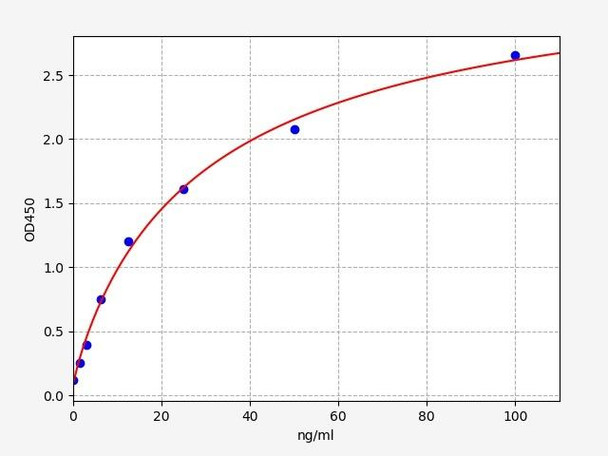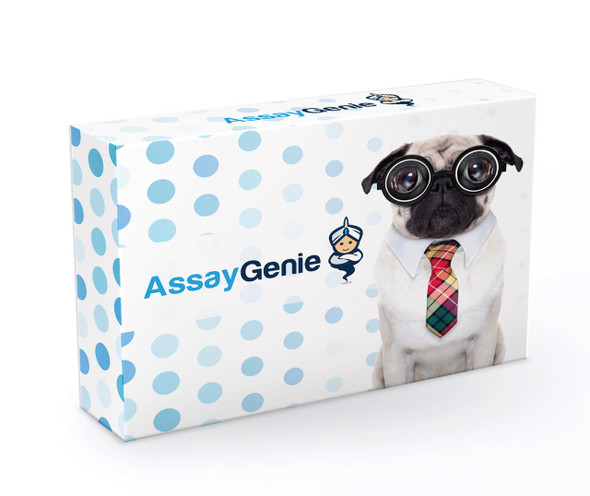Description
Human ACHE/Acetylcholinesterase ELISA Kit
The Human AChE (Acetylcholinesterase) ELISA Kit is specifically designed for the accurate detection of acetylcholinesterase levels in human serum, plasma, and cell culture supernatants. This kit offers high sensitivity and specificity, ensuring accurate and reproducible results for a variety of research applications.Acetylcholinesterase is an important enzyme involved in the breakdown of the neurotransmitter acetylcholine, playing a critical role in regulating nerve impulses and muscle contractions.
Dysregulation of acetylcholinesterase activity has been associated with various neurological disorders, including Alzheimer's disease and Parkinson's disease, making it a valuable biomarker for studying these conditions and potential therapeutic interventions.Overall, the Human AChE ELISA Kit provides researchers with a reliable and efficient tool for studying acetylcholinesterase levels and its implications in human health and disease.
| Product Name: | Human ACHE/Acetylcholinesterase ELISA Kit |
| Product Code: | HUFI01094 |
| Size: | 96 Assays |
| Alias: | ACHE, Acetylcholinesterase, ACEE, ARACHE, N-ACHE, YT, Acetylcholinesterase YT blood group, Apoptosis related acetylcholinesterase |
| Detection method: | Sandwich ELISA, Double Antibody |
| Application: | This immunoassay kit allows for the in vitro quantitative determination of Human ACHE concentrations in serum plasma and other biological fluids. |
| Sensitivity: | 0.938ng/ml |
| Range: | 1.563-100ng/ml |
| Storage: | 4°C for 6 months |
| Note: | For Research Use Only |
| Recovery: | Matrices listed below were spiked with certain level of Human ACHE and the recovery rates were calculated by comparing the measured value to the expected amount of Human ACHE in samples. | ||||||||||||||||
| |||||||||||||||||
| Linearity: | The linearity of the kit was assayed by testing samples spiked with appropriate concentration of Human ACHE and their serial dilutions. The results were demonstrated by the percentage of calculated concentration to the expected. | ||||||||||||||||
| |||||||||||||||||
| CV(%): | Intra-Assay: CV<8% Inter-Assay: CV<10% |
| Component | Quantity | Storage |
| ELISA Microplate (Dismountable) | 8×12 strips | 4°C for 6 months |
| Lyophilized Standard | 2 | 4°C/-20°C |
| Sample/Standard Dilution Buffer | 20ml | 4°C |
| Biotin-labeled Antibody(Concentrated) | 120ul | 4°C (Protect from light) |
| Antibody Dilution Buffer | 10ml | 4°C |
| HRP-Streptavidin Conjugate(SABC) | 120ul | 4°C (Protect from light) |
| SABC Dilution Buffer | 10ml | 4°C |
| TMB Substrate | 10ml | 4°C (Protect from light) |
| Stop Solution | 10ml | 4°C |
| Wash Buffer(25X) | 30ml | 4°C |
| Plate Sealer | 5 | - |
Other materials and equipment required:
- Microplate reader with 450 nm wavelength filter
- Multichannel Pipette, Pipette, microcentrifuge tubes and disposable pipette tips
- Incubator
- Deionized or distilled water
- Absorbent paper
- Buffer resevoir
| Uniprot | P22303 |
| UniProt Protein Function: | ACHE: Terminates signal transduction at the neuromuscular junction by rapid hydrolysis of the acetylcholine released into the synaptic cleft. Role in neuronal apoptosis. Belongs to the type-B carboxylesterase/lipase family. 4 isoforms of the human protein are produced by alternative splicing. |
| UniProt Protein Details: | Protein type:EC 3.1.1.7; Hydrolase; Membrane protein, GPI anchor; Lipid Metabolism - glycerophospholipid Chromosomal Location of Human Ortholog: 7q22 Cellular Component: Golgi apparatus; extracellular space; cell surface; membrane; perinuclear region of cytoplasm; plasma membrane; extracellular region; synapse; basal lamina; nucleus; neuromuscular junction; cell junction Molecular Function:collagen binding; serine hydrolase activity; protein binding; protein homodimerization activity; protein self-association; cholinesterase activity; hydrolase activity; beta-amyloid binding; laminin binding; acetylcholinesterase activity; acetylcholine binding Biological Process: negative regulation of synaptic transmission, cholinergic; nervous system development; muscle development; acetylcholine catabolic process in synaptic cleft; acetylcholine catabolic process; glycerophospholipid biosynthetic process; osteoblast development; cell proliferation; synaptic transmission; synaptogenesis; positive regulation of protein secretion; amyloid precursor protein metabolic process; retina development in camera-type eye; receptor internalization; phospholipid metabolic process; neurotransmitter receptor biosynthetic process; response to wounding; phosphatidylcholine biosynthetic process; regulation of receptor recycling; DNA replication; cell adhesion; protein tetramerization; neurotransmitter biosynthetic process Disease: Yt Blood Group Antigen |
| NCBI Summary: | Acetylcholinesterase hydrolyzes the neurotransmitter, acetylcholine at neuromuscular junctions and brain cholinergic synapses, and thus terminates signal transmission. It is also found on the red blood cell membranes, where it constitutes the Yt blood group antigen. Acetylcholinesterase exists in multiple molecular forms which possess similar catalytic properties, but differ in their oligomeric assembly and mode of cell attachment to the cell surface. It is encoded by the single ACHE gene, and the structural diversity in the gene products arises from alternative mRNA splicing, and post-translational associations of catalytic and structural subunits. The major form of acetylcholinesterase found in brain, muscle and other tissues is the hydrophilic species, which forms disulfide-linked oligomers with collagenous, or lipid-containing structural subunits. The other, alternatively spliced form, expressed primarily in the erythroid tissues, differs at the C-terminal end, and contains a cleavable hydrophobic peptide with a GPI-anchor site. It associates with the membranes through the phosphoinositide (PI) moieties added post-translationally. [provided by RefSeq, Jul 2008] |
| UniProt Code: | P22303 |
| NCBI GenInfo Identifier: | 113037 |
| NCBI Gene ID: | 43 |
| NCBI Accession: | P22303.1 |
| UniProt Secondary Accession: | P22303,Q16169, Q29S23, Q2M324, Q504V3, Q53F46, Q86TM9 Q86YX9, Q9BXP7, A4D2E2, B7ZKZ0, D6W5X7, |
| UniProt Related Accession: | P22303 |
| Molecular Weight: | 58,352 Da |
| NCBI Full Name: | Acetylcholinesterase |
| NCBI Synonym Full Names: | acetylcholinesterase (Yt blood group) |
| NCBI Official Symbol: | ACHE |
| NCBI Official Synonym Symbols: | YT; ACEE; ARACHE; N-ACHE |
| NCBI Protein Information: | acetylcholinesterase; Yt blood group; apoptosis-related acetylcholinesterase |
| UniProt Protein Name: | Acetylcholinesterase |
| Protein Family: | Achelase |
| UniProt Gene Name: | ACHE |
| UniProt Entry Name: | ACES_HUMAN |
*Note: Protocols are specific to each batch/lot. For the correct instructions please follow the protocol included in your kit.
Before adding to wells, equilibrate the SABC working solution and TMB substrate for at least 30 min at 37°C. When diluting samples and reagents, they must be mixed completely and evenly. It is recommended to plot a standard curve for each test.
| Step | Protocol |
| 1. | Set standard, test sample and control (zero) wells on the pre-coated plate respectively, and then, record their positions. It is recommended to measure each standard and sample in duplicate. Wash plate 2 times before adding standard, sample and control (zero) wells! |
| 2. | Aliquot 0.1ml standard solutions into the standard wells. |
| 3. | Add 0.1 ml of Sample / Standard dilution buffer into the control (zero) well. |
| 4. | Add 0.1 ml of properly diluted sample ( Human serum, plasma, tissue homogenates and other biological fluids.) into test sample wells. |
| 5. | Seal the plate with a cover and incubate at 37 °C for 90 min. |
| 6. | Remove the cover and discard the plate content, clap the plate on the absorbent filter papers or other absorbent material. Do NOT let the wells completely dry at any time. Wash plate X2. |
| 7. | Add 0.1 ml of Biotin- detection antibody working solution into the above wells (standard, test sample & zero wells). Add the solution at the bottom of each well without touching the side wall. |
| 8. | Seal the plate with a cover and incubate at 37°C for 60 min. |
| 9. | Remove the cover, and wash plate 3 times with Wash buffer. Let wash buffer rest in wells for 1 min between each wash. |
| 10. | Add 0.1 ml of SABC working solution into each well, cover the plate and incubate at 37°C for 30 min. |
| 11. | Remove the cover and wash plate 5 times with Wash buffer, and each time let the wash buffer stay in the wells for 1-2 min. |
| 12. | Add 90 µl of TMB substrate into each well, cover the plate and incubate at 37°C in dark within 10-20 min. (Note: This incubation time is for reference use only, the optimal time should be determined by end user.) And the shades of blue can be seen in the first 3-4 wells (with most concentrated standard solutions), the other wells show no obvious color. |
| 13. | Add 50 µl of Stop solution into each well and mix thoroughly. The color changes into yellow immediately. |
| 14. | Read the O.D. absorbance at 450 nm in a microplate reader immediately after adding the stop solution. |
When carrying out an ELISA assay it is important to prepare your samples in order to achieve the best possible results. Below we have a list of procedures for the preparation of samples for different sample types.
| Sample Type | Protocol |
| Serum | If using serum separator tubes, allow samples to clot for 30 minutes at room temperature. Centrifuge for 10 minutes at 1,000x g. Collect the serum fraction and assay promptly or aliquot and store the samples at -80°C. Avoid multiple freeze-thaw cycles. If serum separator tubes are not being used, allow samples to clot overnight at 2-8°C. Centrifuge for 10 minutes at 1,000x g. Remove serum and assay promptly or aliquot and store the samples at -80°C. Avoid multiple freeze-thaw cycles. |
| Plasma | Collect plasma using EDTA or heparin as an anticoagulant. Centrifuge samples at 4°C for 15 mins at 1000 × g within 30 mins of collection. Collect the plasma fraction and assay promptly or aliquot and store the samples at -80°C. Avoid multiple freeze-thaw cycles. Note: Over haemolysed samples are not suitable for use with this kit. |
| Urine & Cerebrospinal Fluid | Collect the urine (mid-stream) in a sterile container, centrifuge for 20 mins at 2000-3000 rpm. Remove supernatant and assay immediately. If any precipitation is detected, repeat the centrifugation step. A similar protocol can be used for cerebrospinal fluid. |
| Cell culture supernatant | Collect the cell culture media by pipette, followed by centrifugation at 4°C for 20 mins at 1500 rpm. Collect the clear supernatant and assay immediately. |
| Cell lysates | Solubilize cells in lysis buffer and allow to sit on ice for 30 minutes. Centrifuge tubes at 14,000 x g for 5 minutes to remove insoluble material. Aliquot the supernatant into a new tube and discard the remaining whole cell extract. Quantify total protein concentration using a total protein assay. Assay immediately or aliquot and store at ≤ -20 °C. |
| Tissue homogenates | The preparation of tissue homogenates will vary depending upon tissue type. Rinse tissue with 1X PBS to remove excess blood & homogenize in 20ml of 1X PBS (including protease inhibitors) and store overnight at ≤ -20°C. Two freeze-thaw cycles are required to break the cell membranes. To further disrupt the cell membranes you can sonicate the samples. Centrifuge homogenates for 5 mins at 5000xg. Remove the supernatant and assay immediately or aliquot and store at -20°C or -80°C. |
| Tissue lysates | Rinse tissue with PBS, cut into 1-2 mm pieces, and homogenize with a tissue homogenizer in PBS. Add an equal volume of RIPA buffer containing protease inhibitors and lyse tissues at room temperature for 30 minutes with gentle agitation. Centrifuge to remove debris. Quantify total protein concentration using a total protein assay. Assay immediately or aliquot and store at ≤ -20 °C. |
| Breast Milk | Collect milk samples and centrifuge at 10,000 x g for 60 min at 4°C. Aliquot the supernatant and assay. For long term use, store samples at -80°C. Minimize freeze/thaw cycles. |






